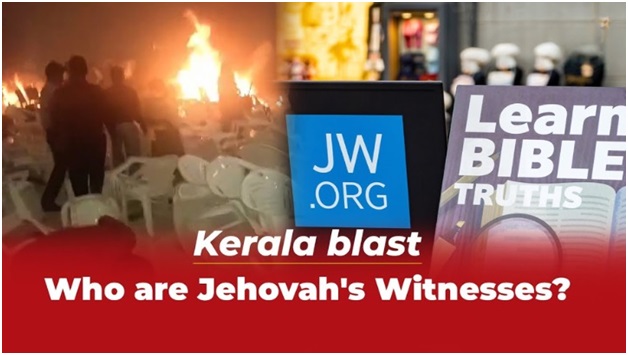Kerala Blast: Who are Jehovah’s Witnesses (Indian Express)

- 30 Oct 2023
Why is it in the News?
- Two people were killed and scores injured after a series of blasts at a Sunday prayer convention of the Jehovah’s Witnesses sect near Kochi.
- The incident took place at the Zamra International Convention and Exhibition Centre at Kalamassery, where around 2,500 faithful from across the state had gathered for a prayer session.
- Dominic Martin, an estranged member of Jehovah’s Witnesses, who is now in police custody, posted a video on social media taking responsibility for the act.
Who are Jehovah’s Witnesses?
- Jehovah’s Witnesses are a Christian sect with a distinctive monotheistic belief system.
- They do not adhere to the Holy Trinity doctrine, which sees God as existing in three equal persons: the Father, the Son (Jesus Christ), and the Holy Spirit.
- Origins in the 1870s:
- The sect's origins trace back to the Bible Student movement initiated in the 1870s by American pastor Charles Taze Russell.
- Today, the Governing Body of Jehovah’s Witnesses is headquartered in Warwick, New York.
- The primary organization responsible for disseminating the sect's doctrines is the Watch Tower Bible and Tract Society of Pennsylvania, also headquartered in Warwick.
- Worship of Jehovah:
- They worship Jehovah as "the one true and Almighty God, the Creator."
- Jehovah is viewed as the God of key biblical figures, including Abraham, Moses, and Jesus.
- Their places of worship are called "Kingdom Halls," which are plain, functional buildings resembling small conference centers.
- View of Jesus Christ:
- Jehovah’s Witnesses recognize Jesus Christ as the "King of God’s Kingdom in heaven" but not as the Almighty God.
- Their beliefs are solely based on the text of the Bible, which they consider to be the word of God.
- Rejection of Traditional Festivals:
- They do not celebrate Christmas or Easter, as they believe these festivals have roots in Pagan traditions.
- Evangelical Work and End-Times Beliefs
- Door-to-Door Evangelism:
- Jehovah’s Witnesses are well-known for their evangelical work, which involves going door to door to share their religious teachings, often referred to as "The Truth."
- They believe that the end of the world is imminent.
- According to their teachings, the "Kingdom of God" will replace human governments and fulfill God's purpose for the Earth.
- Religious Isolation:
- Jehovah’s Witnesses tend to keep a distance from other religious groups.
- They maintain strict neutrality in political affairs and avoid affiliation with other religions.
- Despite their own religious isolation, they respect the choices made by individuals in matters of religion and politics.
- Political Neutrality:
- Jehovah’s Witnesses are well-known for their political neutrality, which sets them apart from many other religious groups.
- While they accept government authority in many matters and pay taxes, they do not vote in elections, serve in the military, or salute the flag.
- They believe that engaging in such acts compromises their primary loyalty to God.
Jehovah’s Witnesses: A History of Persecution
- Jehovah’s Witnesses have no political affiliations, and they renounce violence. However, they make an easy target for governments looking for internal enemies, as they refuse to bow down to government symbols. Many nationalists call them “enemies of the state.”
- As a result, they have often suffered persecution throughout history in many parts of the world.
- In Nazi Germany, they were killed in concentration camps.
- African Jehovah’s Witnesses faced violence for refusing to support dictators.
Jehovah’s Witnesses in India:
- Jehovah’s Witnesses have been present in India since 1905.
- They established an office in 1926 in Bombay (now Mumbai), and obtained legal registration in 1978.
- The Jehovah’s Witnesses website (jw.org) mentions that their members in India have at times been accused of trying to convert people due to their evangelical work.
Jehovah’s Witnesses and National Anthem Case:
- Bijoe Emmanuel & Ors vs State Of Kerala & Ors
- In 1985, three Jehovah’s Witness students in Kerala faced suspension for refusing to sing the national anthem on religious grounds.
- Their case reached the Supreme Court in 1986, emphasizing the freedom of conscience enshrined in Article 25 of the Constitution.
- The Supreme Court ruled that respectfully standing, without vocal participation, during the anthem did not violate the Prevention of Insults to National Honour Act of 1971.
- This landmark case balanced religious freedom with national symbols, setting a significant precedent in India's legal history.
